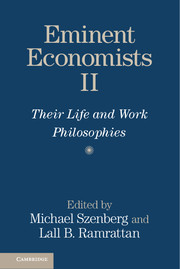Book contents
- Frontmatter
- Dedication
- Contents
- List of Contributors
- Foreword
- Preface and Acknowledgments
- Introduction
- 1 Being There: An Intellectual Journey
- 2 Social Norms in Economics and in the Economics Profession
- 3 Personal Reflections on My Professional Life
- 4 Gray Eminence?
- 5 Biochemist to Economist
- 6 Puzzles and Paradoxes: A Life in Applied Economics
- 7 Succeeding in Economics
- 8 My Research Strategy
- 9 My Philosophy of Economics, Life, and Everything (Not!)
- 10 Finding a Niche
- 11 Become an Economist – See the World
- 12 Practitioner of the Dismal Science? Who, Me? Couldn’t Be!!
- 13 One Job, Four Careers
- 14 My Life and Research Strategy
- 15 How I Ended Up Being a Multifaceted Economist and the Mentors I Have Had
- 16 Searching for My Personal Philosophy
- 17 Learning about the Evolving International Economy
- 18 Confessions of a Wellesley FEM
- 19 God, Ants, and Thomas Bayes
- 20 The Path of a Monetary Economist
- 21 Learning from the Field
- 22 Order in and through Disorder: The Invisible Hand as a Turbulent Regulator
- 23 The Education of an Economist
- 24 Faith, Science, and Religion
- 25 My Studies in International Economics
- 26 Sailing into the Wind
- 27 My Life and Work Philosophy
- 28 Scaling Fortress Economics
- 29 The Accidental Economist
- Index
Preface and Acknowledgments
Published online by Cambridge University Press: 05 June 2014
- Frontmatter
- Dedication
- Contents
- List of Contributors
- Foreword
- Preface and Acknowledgments
- Introduction
- 1 Being There: An Intellectual Journey
- 2 Social Norms in Economics and in the Economics Profession
- 3 Personal Reflections on My Professional Life
- 4 Gray Eminence?
- 5 Biochemist to Economist
- 6 Puzzles and Paradoxes: A Life in Applied Economics
- 7 Succeeding in Economics
- 8 My Research Strategy
- 9 My Philosophy of Economics, Life, and Everything (Not!)
- 10 Finding a Niche
- 11 Become an Economist – See the World
- 12 Practitioner of the Dismal Science? Who, Me? Couldn’t Be!!
- 13 One Job, Four Careers
- 14 My Life and Research Strategy
- 15 How I Ended Up Being a Multifaceted Economist and the Mentors I Have Had
- 16 Searching for My Personal Philosophy
- 17 Learning about the Evolving International Economy
- 18 Confessions of a Wellesley FEM
- 19 God, Ants, and Thomas Bayes
- 20 The Path of a Monetary Economist
- 21 Learning from the Field
- 22 Order in and through Disorder: The Invisible Hand as a Turbulent Regulator
- 23 The Education of an Economist
- 24 Faith, Science, and Religion
- 25 My Studies in International Economics
- 26 Sailing into the Wind
- 27 My Life and Work Philosophy
- 28 Scaling Fortress Economics
- 29 The Accidental Economist
- Index
Summary
Some time ago we came across Paul Sartre’s play Huis-clos (No Exit), which contains the famous line “L’enfer c’est les autres”: “Hell is other people.” This is only half true. Rereading the essays that appear in this volume and interacting with the contributors, we suggest a complementary line, “Heaven is other people.” Juxtaposing both lines forms one of life’s great equations.
Our contributors traverse continents and cultures and disciplines, and ultimately end up making major inroads in economics by cultivating their own garden. They heed Voltaire’s wise words expressed in Candide, “Il faut cultiver notre jardin.” Our interest in learning, analyzing the various paths the contributors have taken is to discover the wellspring of creative impulses in order to cultivate our own garden. Besides being scholarly, the vivid mosaic essays presented here are inspiring, engaging, meditative, affecting, and even entertaining. They point the path to scholarly success. The scholars presented here are “round” in the way E. M. Forster describes in Aspects of the Novel. Such characters are dynamic and “capable of surprising in a convincing way.” Robert Frost noted that “[p]oetry begins in delight and ends in wisdom.” The same can be said about reading the essays written for this volume: they make us well aware how wisdom is gained in the scholarly world. Given the turbulent times of the world we live in, we are reminded of Anatole Frances’s line: “He is a truly great historian; he has enriched his subject with a new uncertainty.”
- Type
- Chapter
- Information
- Eminent Economists IITheir Life and Work Philosophies, pp. xix - xxPublisher: Cambridge University PressPrint publication year: 2014



